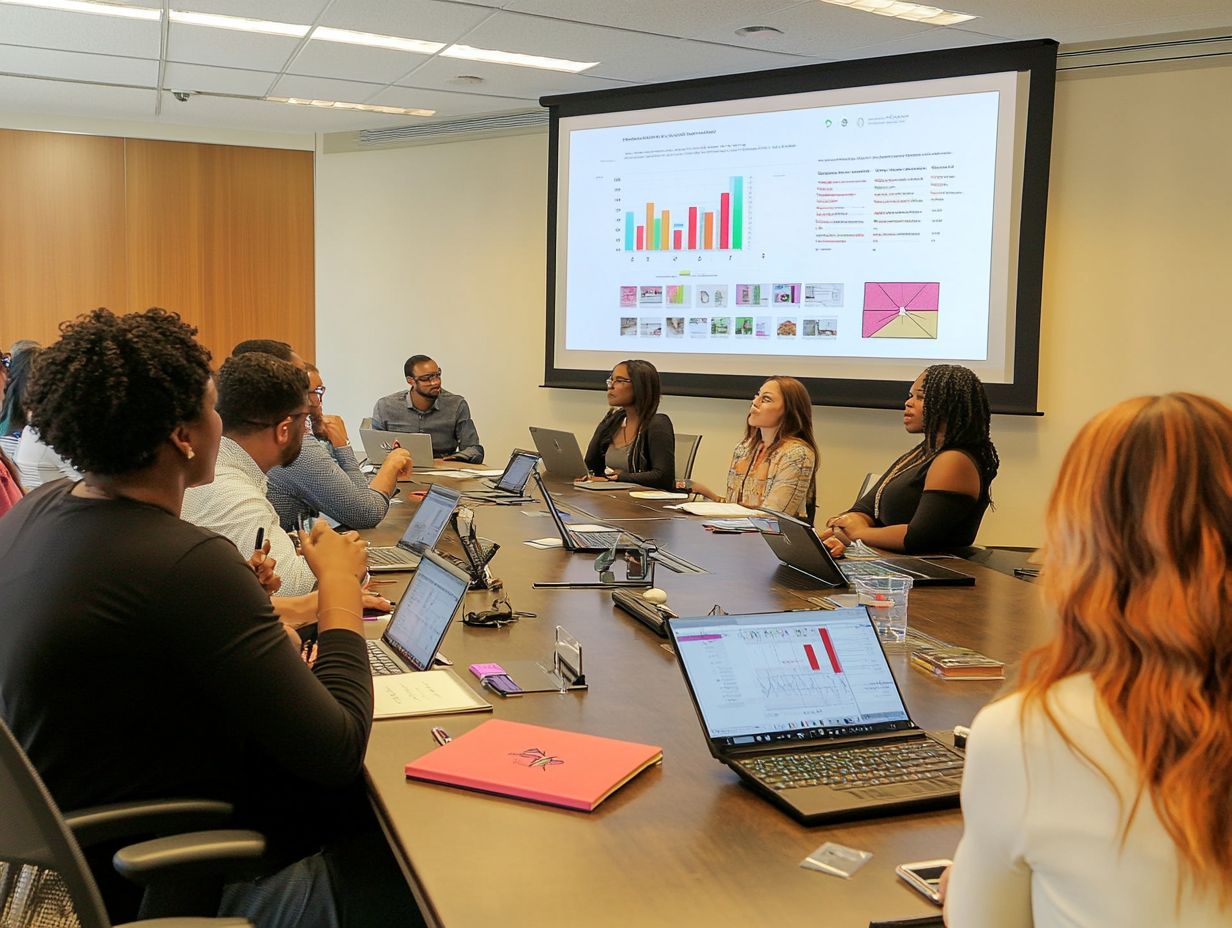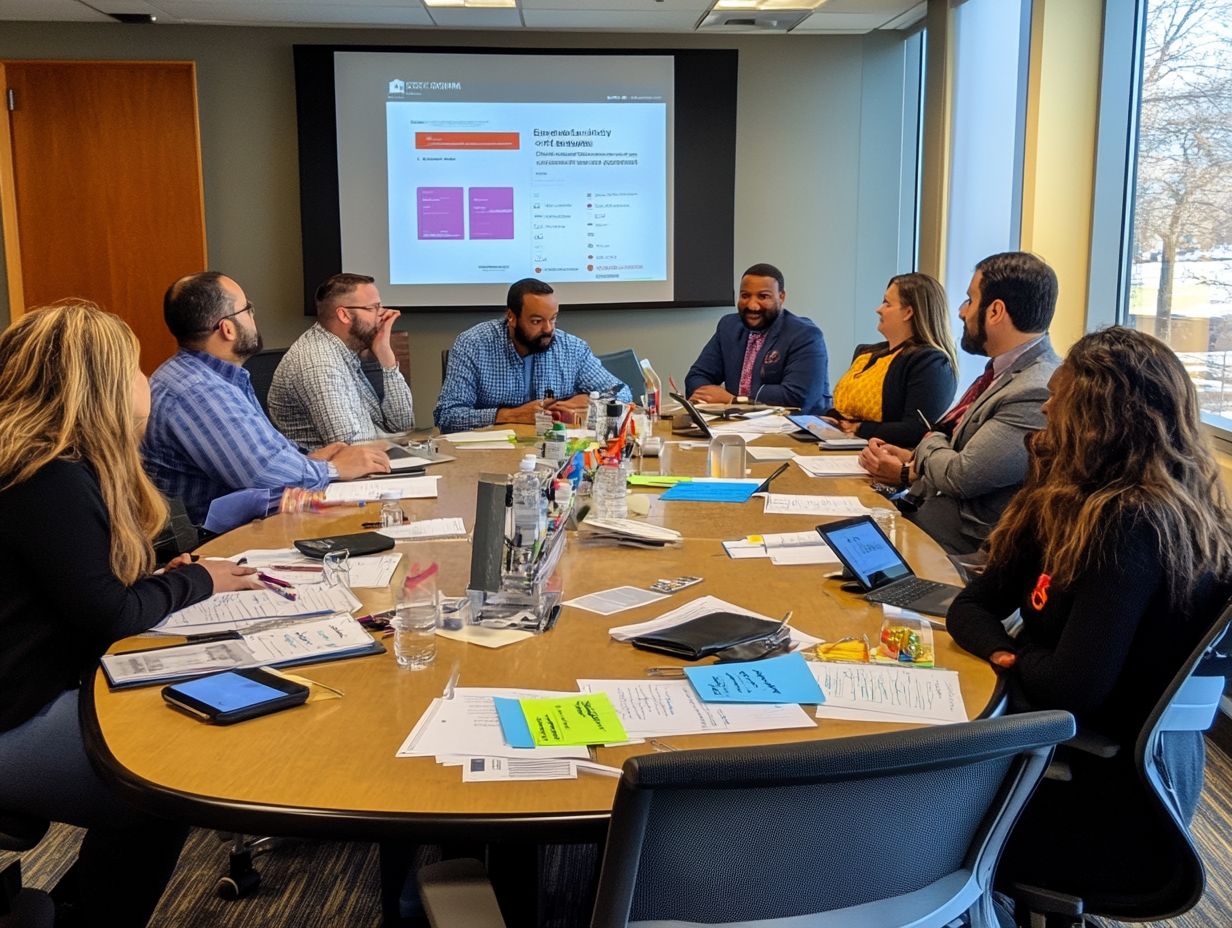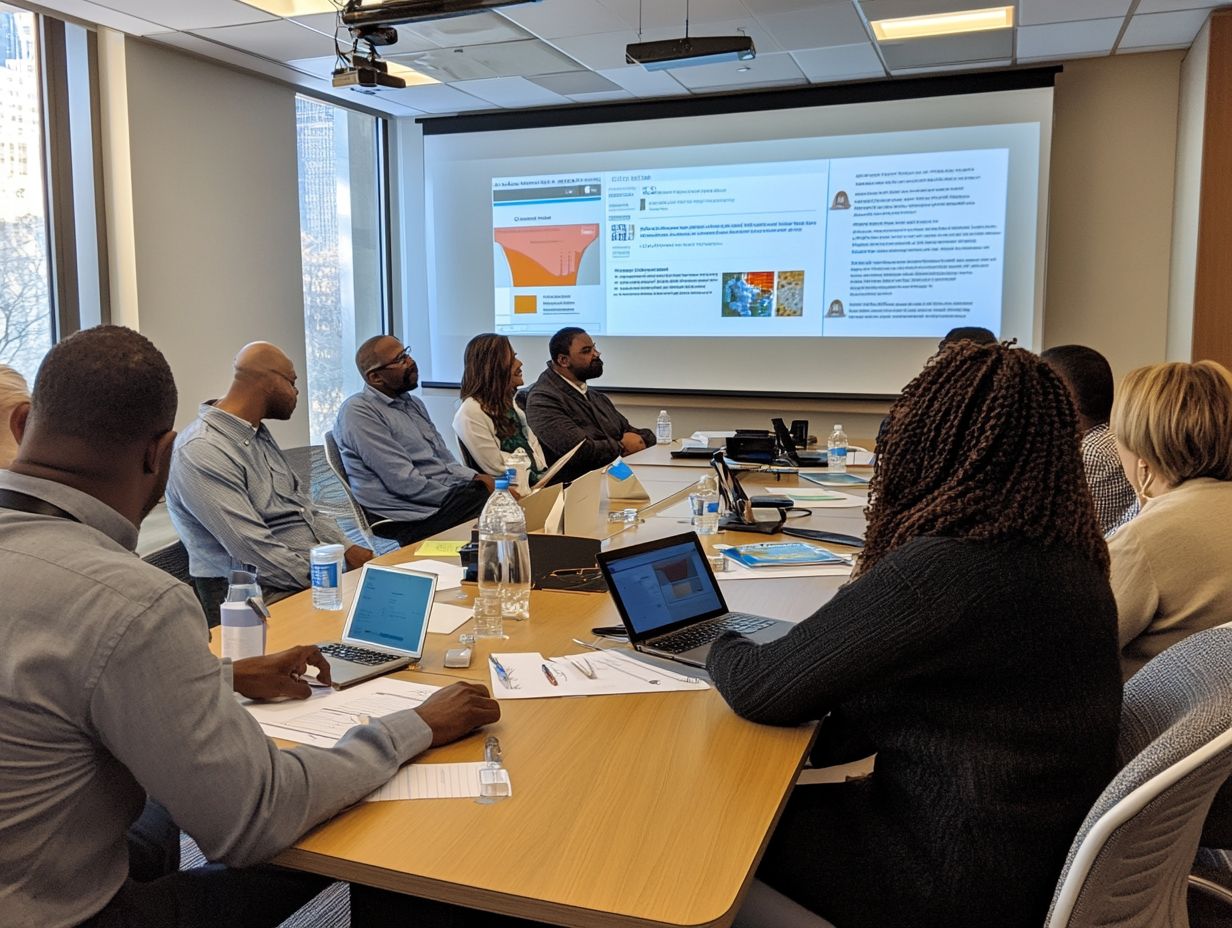“Effective Methods for Training CRM Users”
Effective Customer Relationship Management (CRM) is essential for any organization striving to elevate customer satisfaction and optimize operations.
The success of your CRM system heavily relies on the training provided to its users.
This article delves into the importance of CRM training, beginning with the identification of training needs by assessing user skill levels and establishing specific objectives.
You ll be guided through designing a tailored training program, executing it with precision, and evaluating its effectiveness to ensure your team is fully equipped to harness the potential of your CRM system.
Dive in to discover how you can transform your CRM users into adept champions of customer engagement!
Contents
- Key Takeaways:
- Identifying Training Needs
- Identifying Specific Training Objectives
- Designing a Training Program
- Developing Training Materials
- Selecting Training Methods
- Implementing the Training Program
- Evaluating Training Effectiveness
- Frequently Asked Questions
- What are the most effective methods for training CRM users?
- How can practical training effectively train CRM users?
- Why are online tutorials useful for training CRM users?
- What are the benefits of engaging workshops for training CRM users?
- How can personal coaching effectively train CRM users?
- What is the role of job shadowing in training CRM users?
Key Takeaways:

Effective CRM training is crucial for ensuring user skill levels and maximizing ROI.
User skill levels should be assessed, and specific training objectives identified before designing a training program.
Training materials should be developed, and training methods carefully selected to ensure the program is effective.
Understanding the Importance of CRM Training
Understanding the importance of CRM training is essential for elevating your customer relationship management strategies and making the most of your CRM software.
Proper training enhances data accuracy and integrity while also significantly boosting sales performance and customer satisfaction through informed, consistent interactions among your team.
By equipping your employees with the skills to navigate CRM platforms effectively, you ll see improved customer interactions immediately!
Implementing best practices like regular updates and proper segmentation allows you to tailor communications to meet specific client needs, driving higher engagement and loyalty.
Comprehensive user management training helps your teams manage roles and permissions effectively, ensuring sensitive customer data remains protected while promoting collaboration.
Gaining CRM certification a recognized standard for competency boosts your administrators’ skill level and confidence in utilizing the software.
This leads to smoother sales processes and strengthened customer relationships, setting the stage for sustained growth.
Identifying Training Needs
Ready to take your CRM training to the next level? Let s start by identifying what your team needs!
Identifying training needs within your organization is a crucial first step in crafting an effective CRM training program that aligns seamlessly with both user management and organizational goals.
By carefully assessing the specific skills and knowledge gaps among your team members, you can develop a targeted training plan that caters to their learning preferences, enhancing performance support and driving overall success.
Assessing User Skill Levels
Assessing user skill levels in CRM training is crucial for tailoring a program that meets the diverse needs of your team, whether they re sales representatives or CRM administrators.
This process can include reviewing user documentation, conducting surveys, and observing interactions within the CRM software to pinpoint skill gaps and enhance training effectiveness.
Incorporating practical exercises can significantly boost learning. For example, role-playing scenarios can simulate real-world challenges, providing a chance to apply your skills in a safe setting.
Establishing feedback loops where you receive constructive critiques on your performance can offer valuable insights into your progress.
This data not only informs trainers about areas that need attention but also helps craft customized training sessions and develop self-help resources for you to access independently, promoting continuous growth and autonomy.
Identifying Specific Training Objectives
Identifying specific training objectives is a crucial step to ensure that your CRM training aligns with personal and organizational performance measures. This alignment ultimately drives sales growth and enhances productivity.
By establishing clear and measurable objectives, you can focus your team on key areas, such as boosting CRM functionality and optimizing customer interactions.
Setting SMART objectives Specific, Measurable, Achievable, Relevant, and Time-bound gives you a structured approach to effectively track progress. This creates a roadmap that not only motivates participants but also fosters a sense of accountability.
Continuous training goes beyond mere short-term gains; it lays the groundwork for long-term success and safeguards the integrity of data within the CRM system.
By regularly updating skills and knowledge, you enable your organization to adapt to evolving market demands. This adaptability ensures competitiveness while maximizing the potential of your CRM.
Designing a Training Program

Designing a comprehensive CRM training program requires crafting effective training materials and selecting suitable methods to meet the diverse needs of your team members.
This program should seamlessly integrate team training strategies and contextual approaches. When every user can navigate the CRM software with confidence, they fully grasp its features.
By doing so, you’ll enhance user adoption and engagement analytics, paving the way for a more proficient and cohesive team.
Developing Training Materials
Developing effective training materials for CRM training is paramount. These materials help you fully grasp the functionalities and features of the CRM software.
Tailoring these materials to various learning preferences is essential. You ll benefit from user documentation, video tutorials, and interactive training sessions designed to deepen your understanding of CRM capabilities.
In today s diverse learning landscape, it s vital to adopt varied approaches that resonate with your individual learning style. Engaging formats like visual aids, infographics, and hands-on activities capture your attention and reinforce the material, making retention much easier.
By ensuring that training resources cater to auditory, visual, and kinesthetic learners alike, organizations can create an inclusive atmosphere. This adaptability in training strategies leads to higher proficiency levels, enabling you to navigate the CRM tools with confidence and ease.
Selecting Training Methods
Selecting the right training methods for your CRM training is pivotal in achieving effective learning outcomes. Ensuring user engagement throughout the process is essential.
You have a variety of options at your disposal, from in-person sessions and online courses to blended learning models that integrate continuous training with reporting analytics.
Each approach brings its own set of advantages and challenges. For example, in-person training fosters collaboration and facilitates immediate feedback, while online courses provide flexibility and accessibility that can fit into busy schedules.
Blended learning merges the best aspects of both, though it may require careful planning to ensure everything flows seamlessly.
To truly elevate the training experience, it s essential to emphasize evaluating these methodologies effectiveness. Gathering user feedback and analyzing performance metrics will be crucial in addressing any gaps and refining the program continuously.
With this commitment, you ll build a skilled and confident workforce ready to tackle any challenge!
Implementing the Training Program
To implement the CRM training program effectively, you must engage in meticulous planning and execution. This enhances team collaboration and ensures that every participant reaps the full benefits of the training sessions.
This involves configuring the system correctly and preparing comprehensive materials. Fostering a supportive environment encourages active participation and valuable feedback from users.
Preparing for Training Sessions
Preparing for your Customer Relationship Management (CRM) training sessions requires thoughtful planning. Start by gathering all necessary resources and establishing a clear agenda. Ensure each participant has onboarding materials and user support!
This level of preparation is crucial for creating a smooth training experience. It helps maintain engagement and keeps the focus on essential performance metrics.
To elevate your preparation, develop a comprehensive training checklist. This allows you to confirm that every essential material is ready before the session begins. Don’t overlook the technology ensure that projectors, microphones, and software are set up and functioning properly to avoid disruptions!
Equipping your facilitators is just as important. Clarifying their roles enables them to guide participants effectively. When you meticulously plan every detail of the training, you enhance user learning and significantly boost retention rates.
This approach enables participants to absorb and apply their newfound knowledge with confidence, setting them up for success!
Conducting Training Sessions

Conducting CRM training sessions requires a structured approach to deliver content effectively while engaging participants through interactive exercises and contextual training.
This hands-on method allows users to acquire practical skills in user management and apply CRM features in real-world scenarios.
To enrich the learning experience, consider incorporating techniques like interactive discussions, role-playing, and group activities. These strategies can significantly elevate engagement levels!
When you enable participants to actively take part in the learning process, the training becomes more enjoyable and reinforces the concepts being taught.
Contextual training bridges theoretical knowledge with practical application, enhancing the overall user experience. When users connect their training to actual tasks, they are more likely to apply CRM functionalities effectively, leading to greater productivity and satisfaction.
Evaluating Training Effectiveness
Evaluating the effectiveness of your CRM training programs is crucial to ensure outcomes align with user proficiency and organizational goals. Act now to ensure success!
Implement feedback loops and measurement tools to thoroughly assess the success of your training initiatives. This proactive approach enhances user competence and drives your organization’s growth and efficiency.
Assessing User Proficiency
Assessing user proficiency after CRM training is essential for gauging its effectiveness and ensuring the integrity of your CRM system’s data. This assessment helps identify knowledge gaps and areas where ongoing training is necessary!
To achieve a thorough evaluation, employ various methods:
- Practical tests that allow users to demonstrate their ability to navigate and utilize CRM features in real-time.
- User feedback gathered through surveys or interviews for valuable insights into confidence levels and specific challenges.
- Observational assessments where trainers monitor users in action to reveal behavioral trends and common pitfalls.
Together, these assessments reveal current proficiency levels and guide tailored training initiatives, paving the way for continuous improvement and fostering more efficient use of the CRM system.
Measuring ROI of Training
Measuring the ROI of CRM training is essential for understanding its impact on your organization s performance and sales growth.
Evaluate training effectiveness through key performance indicators. Align outcomes with your marketing strategies to make informed decisions about future investments.
Explore exciting metrics that showcase the benefits of training programs. Increased sales figures often directly indicate successful CRM adoption.
Improved customer satisfaction scores show enhanced service quality and stronger client relationships.
Reduced turnover rates suggest that employees find value in their roles. This boosts morale and fosters loyalty within your team.
Maximize your training initiatives by continuously evaluating and adjusting your strategies. Regular analysis of ROI insights allows you to tailor training to emerging needs.
Frequently Asked Questions
What are the most effective methods for training CRM users?

The best methods for training CRM users include practical training, online tutorials, engaging workshops, personal coaching, and job shadowing.
These options combine theory with practice, ensuring users fully understand the CRM system.
How can practical training effectively train CRM users?
Practical training gives users direct access to the CRM system. They learn its features with guidance, promoting comfort and confidence.
This method allows for immediate feedback, helping users troubleshoot any issues right away.
Why are online tutorials useful for training CRM users?
Online tutorials are convenient and budget-friendly. Users can learn at their own pace with videos, step-by-step guides, and quizzes to reinforce their knowledge.
These resources also provide easy access to reference materials in the future.
What are the benefits of engaging workshops for training CRM users?
Engaging workshops create a structured learning space. Users can interact with each other and the trainer through discussions and hands-on activities.
Role-playing scenarios enable practice in a simulated environment, boosting collaboration and peer learning.
How can personal coaching effectively train CRM users?
Personal coaching offers tailored training sessions with a dedicated trainer. This approach suits users needing individualized attention or who face specific challenges.
It allows for a custom training experience that directly addresses users questions.
What is the role of job shadowing in training CRM users?
Job shadowing lets users observe experienced colleagues as they use the CRM system. This method provides hands-on learning opportunities and allows users to see real-life applications.
Users can ask questions and gain practical insights while learning from those with more experience.






